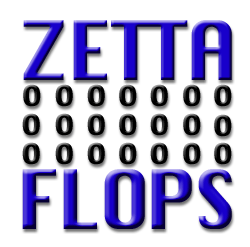
Zettaflops seeks to fill an "expectations gap" in computing with fundamental new ideas. Computer users expect Moore's Law to propel computers to ever-higher performance levels, yet computer scientists and engineers know limits due to the physics of computation. The physics of computation permits a rise in computer performance with approaches like neural networks, reversible logic, and potentially others. The gap is that computer users expect future computers to run FORTRAN-derived languages and Windows-like operating systems, which will not be the way of the future beyond a point.
We seek ideas and dialog with professionals about computing at the Zettaflops level or equivalent.
What device-level technologies could be used to produce a Zettaflops computer?
If we had adequate devices, would it be most useful to organize it as a supercomputer, an artificial neural network, or perhaps something different?
If we choose to follow the traditional computing paradigm, how will users become reconciled to physically necessary computing paradigms like reversible computing?
The Zettaflops activity began in the 1990s under the name Petaflops. In the mid 1990s, Thomas Sterling launched this series of conferences aimed at considering the feasibility of a Petaflops supercomputer, which at the time was an unthinkably large performance level. There were conferences every few years in the 1990s until it became accepted that a Petaflops supercomputer would be built. The conferences were resumed in 2004 under the term Zettaflops, the name change to keep the extreme forward-looking focus in an environment of progress.
The last workshop under the name Zettaflops was in 2007, yet the Zettaflops website remains a resource for advanced computing ideas.
CATC Information:
Cryogenic Adibatic Transistor Circuits (CATC), a technology for quantum computer control
Past Workshops:
Fault-Tolerant Spaceborne Computing Employing New Technologies, 2010, May 25-26, 2010, Albuquerque, NM, USA (working groups May 24 and 27)
Fault-Tolerant Spaceborne Computing Employing New Technologies, 2009, May 26-29, 2009, Albuquerque, NM, USA
2020 Computing: Virtual Immersion Architectures (VIA-2020), SRC/NSF/ITRS Forum on Emerging nano-CMOS Architectures in conjunction with Frontiers of Extreme Computing 2008, July 10-11, 2008, Santa Cruz, CA, USA
Fault-Tolerant Spaceborne Computing Employing New Technologies, May 28-30, 2008, Albuquerque, NM, USA
Frontiers of Extreme Computing 2007, October 21-25, 2007, Santa Cruz, CA, USA
Frontiers of Extreme Computing 2005, October 23-27, 2005, Santa Cruz, CA, USA
The Path to Extreme Supercomputing, October 12, 2004, Santa Fe, NM, USA
Contact: Erik P. DeBenedictis, (505) 440-2176
Modified on: October 27, 2019